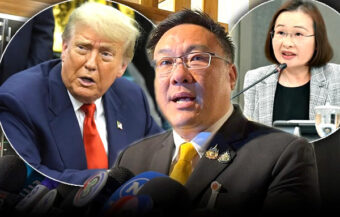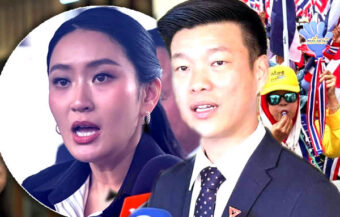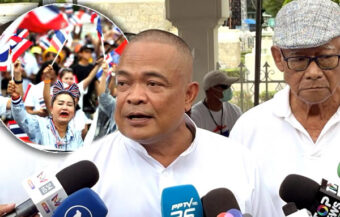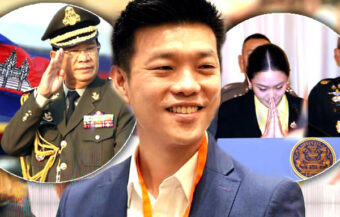In a June 2018 interview with Time Magazine, Thailand’s Prime Minister General Prayut Chan ocha, categorically described China as the kingdom’s number one partner despite only having established diplomatic relations with the People’s Republic of China in 1975 after fighting a proxy war with the communist regime in Beijing for decades. The PM’s view, however, is widely shared in Thailand where Chinese culture and propaganda is ubiquitous but where there is also some awareness of the danger. US and western influence, at the same time, is certainly waning.
A visit this week by the Chinese Foreign Minister, Wang Yi, to Bangkok is coming at a time of historically raised tensions between the United States and China. It also finds the kingdom at a crossroads even if it has been increasingly moving towards China. It may, at some point in the future, face a rubicon moment while, right now, there are two unpredictable factors, the Covid 19 pandemic’s impact on the world and the fate of US President Donald Trump.
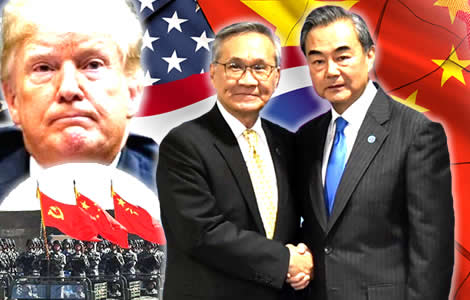
The Chinese Foreign Minister, His Excellency Wang Yi will visit Thailand, on Wednesday and Thursday for talks with the Thai Deputy Prime Minister and Minister of Foreign Affairs, Don Pramudwinai, on both bilateral and regional issues as well as ongoing efforts by both countries at recovery from the Covid 19 pandemic.
‘This official visit aims at strengthening the Comprehensive Strategic Cooperative Partnership between Thailand and China amidst regional and global challenges, including those posed by the Covid-19 pandemic,’ a Chinese Foreign Ministry statement, issued on Monday, declared.
Chinese delegation visiting Laos, Malaysia and Cambodia where a trade pact has been signed
The Chinese delegation is also visiting Laos, Malaysia and Cambodia where it is reported that China has signed a free trade agreement with Thailand’s neighbour in relation to agriculture, tourism and general trade which will see both countries lower tariffs with each other.
Thailand signed a free trade agreement with China in 2003 but there have been ongoing talks to further liberalise trade between the two countries even further as Thailand desperately seeks increased access to export markets with an expected export contraction this year of approximately 9%.
A statement was issued concerning the Chinese pact with Cambodia on Monday by the Ministry of Commerce in Beijing but it did not give details on the signatories to the agreement on both sides.
There is a concern in Bangkok that Chinese influence in Cambodia is rising and particularly at unconfirmed reports, stoutly denied by Cambodian authorities, that China has signed a secret military cooperation pact with Cambodia.
Reports of Chinese secret access to Cambodian naval base on the Gulf of Thailand strongly criticised by US
This news emerged in June and suggested that China has struck a deal giving it access to the Ream Naval Base on the Gulf of Thailand within the province of Sihanoukville. The news drew a sharp rebuke from US officials at the US Embassy in Phnom Penh.
The deal coincided with the public demolition of a building at the site built in association with the United States.
‘We are disappointed that Cambodian military authorities have chosen to demolish a maritime security facility that is only seven years old and was a sign of US-Cambodia relations,’ Chad Roedemeier of the US Embassy declared. ‘Such a military presence would negatively impact the US-Cambodia bilateral relationship and be disruptive and destabilizing to the Indo-Pacific region.’
The deal has been consistently denied by Cambodian officials including the kingdom’s strongman, Prime Minister Hun Sen, who says the naval base is open to all countries.
Chinese envoys to observe Covid 19 protocol
While in Bangkok, the Chinese Foreign Minister is also expected to pay a courtesy call on the Thai Prime Minister, Prayut Chan ocha at Government House.
A statement on Monday from the Thai Foreign Ministry underlined that the Chinese delegation will be observing preventative measures against the Covid 19 virus laid out in official protocols to protect the public health of the Thai people.
Emerging tensions between the US and China can no longer be ignored including Thailand’s altered stance as it moves increasingly within China’s orbit
The visit is taking place against the backdrop of rising and already dangerous rift between China and the United States in the region particularly linked with Taiwan and tensions over the South China Sea.
The situation has seen a stronger and more active line being taken by the current US administration.
In May, the new US ambassador to the kingdom, Michael George De Sombre came out and declared baldly that the United States is a better partner and friend for Thailand while, at the same time, insisting that Thailand does not have to decide between the two powers.
The statement itself tacitly accepted that the hand in glove, dominant relationship between the United States and Thailand that existed in the 1960s, 1970s and even in the 1980s was over.
Mr De Sombre openly admitted that relations between Beijing and Washington have deteriorated and squarely blamed previous US administrations for failing to address significant problems with China which the current US administration feels must be urgently dealt with now.
Although Thailand is considered a major non-Nato ally of the United States and for many decades was among America’s staunchest allies, that situation has now changed as Thailand has moved increasingly into China’s orbit.
Economic changes in China drew Thailand in as it pounced on an economic opportunity
Thailand established diplomatic ties with Communist China in 1975 and adopted the one-China policy in 1978, thereby demoting its relationship with the Republic of China or Taiwan.
It has drawn ever closer to Beijing particularly after the country’s northern neighbour switched its economic ideology under the leadership of Deng Xiaoping from 1978 and became a valuable new market for Thailand.
This offered Thailand an irresistible economic opportunity which it pursued assiduously and trade between the two countries flourished.
Coups in 2006 and 2014 have moved Thailand further from the West as have radical western social changes
However, many analysts also believe that since the coups of 2006 and that of 2014, which have severely damaged Thailand’s long term international standing and relationships abroad, the ruling elite in Thailand has been moving away from the western milieu of democratic government and society which has evolved to the point where institutions such a the European Union and the US Congress are increasingly concerned with social issues as opposed to simply international commerce and capitalism.
This has meant that trade has been linked to conditions relating to human rights and universal social compacts as part of trade agreements. No such terms or hindrances apply in dealing with the communist regime in Beijing.
Indeed, radical and progressive social and political changes have also occurred in western countries that put them at odds with Thailand’s more traditional outlook and culture.
This has meant that the strategically balanced and once mutually beneficial alliance between Thailand and the United States has been gradually weakened simply because there is less convergence today when it comes to mutual interests.
Even while promoting ASEAN, Thailand has still moved closer to China, driven by economics
In the meantime, Thailand continues to play its historic game of hedging diplomacy by playing off the rival powers while emphasising its membership of the 10 member ASEAN group of nations within Southeast Asia.
However, even here, the kingdom is moving further towards China in terms of economic and military cooperation. The kingdom still maintains its relationship with the United States with regular arms purchases and training.
All this, while Thailand is also vastly increasing its military spending with the People’s Republic of China notably of late for submarines and naval vessels.
Thailand is also showing a strong interest in Chinese internet control systems and is working in full cooperation with shunned Chinese firm Huawei on the country’s proposed 5G network.
Decline of American influence in Thailand
In a memorable Time Magazine interview in June 2018, the Thai Prime Minister, General Prayut Chan ocha, who has since been elected democratically in the March 2019 General Election but who was installed initially in the 2014 coup, made clear the country’s position with regard to China.
‘The friendship between Thailand and China has been over thousands of years, and with the USA for around 200 years, and we remain these ties between our fellow countries until now. China is the number one partner of Thailand, along with other countries in the second and third place like the U.S. and others,’ General Prayut told the reporters from Time magazine.
This can be explained by a massive growth in Chinese popular culture that has been exported across Asia in the last few decades and particularly in recent years with Chinese films and TV shows.
This has also been accompanied, in more recent years, with more anti-western and indeed anti-American themes in such movies and shows.
This has all happened while the United States has elected US President Donald Trump whose message and unpredictable mode of governing has alienated many in Asia across all levels of society.
Obama showed little interest in Thailand
Even before Trump, the Obama administration showed little interest in dealing with Thailand as China increased its power and ramped up its presence in the region.
During the tenure of President Trump, the United States has taken a decisive posture towards China concerning trade, the South China Sea and what could prove quite significant, Taiwan.
Taiwan could be the trigger
So much so that in recent months, a retired and respected US military analyst, James Fannell, has predicted that we are now within a highly dangerous window of opportunity for China where it may, at any point, decide to invade the breakaway island of Taiwan that Beijing claims is part of China and has long vowed to restore even by military means.
Mr Fannell has said publicly that the danger of this happening is ‘very high’ and while he predicts it may happen sometime between 2025 and 2030, he assesses that it could happen at anytime from this point.
His warnings have coincided with similar statements from outspoken former Australian Prime Minister and China expert, Kevin Rudd, in recent weeks suggesting that a real conflagration between the United States and China, this year, cannot be ruled out.
‘China is in a mode of expansion, trying to expand outward,’ said Taiwanese Foreign Minister, Joseph Wu, last month. ‘The threat is very real and therefore Taiwan’s preparation is also very serious.’
Some analysts have even suggested that a military conflict in which the United States was forced to retreat, would, at this point, signal the end of the Pax Americana or at least American influence with major consequences including a possible devaluation of the US currency which may prove catastrophic to the world economy as we know it.
Some analysts speculate that this could be the prelude to a decoupling of Asia from the western world economically, ironically an outcome openly speculated upon by US President Donald Trump in some of his more erratic outbursts this year.
For the expat and foreigner community in Thailand, it would, more than likely, spell the end of the road or even worse.
Both Bangkok and Beijing openly await the result of the US election which will be impactful
All this while both Bangkok and Beijing await the outcome of the US Presidential election in November.
It is suggested that, in some Thai government circles, the biggest fear is that the US President will be reelected and at some point, target Thailand on some pretext, possibly because of its closer ties with China or some other unpredictable issue.
Thailand, this year, found itself excluded from a US system of more benign trade preferences following its ban on several US-manufactured chemical products after it ignored US diplomatic representations to reconsider the move.
Told later that the two issues were unrelated and the removal of trade preferences was linked to poor labour rights in Thailand, many still believe the move was Trumpian in nature.
It seems that Thailand has forgotten the period from the 1950s to the late 1970s when the kingdom fought a vicious proxy war against communist China which funded and supported a communist insurgency in the country aiming to overthrow the establishment.
In 2019, the United States became the largest export market in the world for Thailand while Japan was the largest investor in the kingdom yet the Thai government appears to openly and persistently espouse stronger economic co-operation and investment opportunities with China as its preferred way forward.
Some opposition in Thailand to closer ties with China even at a parliamentary level revealed in debate
There is growing opposition in Thailand, in many quarters, to closer ties with China.
In February, while debating a motion of no confidence in the Thai government in parliament, two opposition MPs, Ekkapob Pianpises from Chiang Rai and Khon Kaen MP, Saratsanun Unnopporn of Pheu Thai, the largest Thai political party, warned of Thailand becoming a vassal state of China.
The debate came at the same time as the Chinese Foreign Minister, Wang Yi, held a previous meeting with his Thai counterpart in Beijing where he praised the Thai PM for Thailand’s Covid 19 efforts and its support of China and the World Health Organisation at the height of the outbreak in Wuhan.
The foreign minister described Thailand as a ‘friend in need’ and referred to the two countries as one family.
Students online voice opposition to China but this makes diplomacy even more difficult
There are also signs that pro-democracy students and online campaigners for more open and liberal democracy in Thailand are increasingly identifying themselves as anti-China.
This year has seen what has been termed the ‘milk tea alliance’ where online groups in Thailand, Taiwan and Hong Kong have waged an online war against counterparts in mainland China.
However, this is counterproductive for US and indeed western diplomats trying to sway Thailand’s leadership towards western norms as the current student-led, pro-democracy protests are seen by many in Thailand’s mainstream as too radical because of their calls for reform of the Thai monarchy.
Radical student protests are not helping efforts to draw Thailand’s elite and even ordinary conservative Thais closer to the West and its core values
The current, unpopular attack by student protesters on the monarchy has made the job of promoting western values and understanding with those in Thailand who exercise power and influence, more difficult.
This also applies to many ordinary Thais who are both traditional and conservative in their thinking.
Increasingly, Thailand’s elite are beginning to see calls for democratic reform, as articulated by the radical and progressive student movement, as a potential descent into chaos as seen on the streets of western countries, particularly the United States, where progressive mobs have embraced what the former army chief General Apirat Kongsompong described as ‘communistic thinking’ in a memorable speech last year.
The west appears to be in danger of losing contact with its core values of personal liberty and freedom because of a radical and ideological agenda emanating from universities.
This is what is on offer, on one hand, while the unpredictability of US President Donald Trump is on the other.
The consequence is that, where those in power in Thailand are concerned, China is pushing an open door unless there is a radical shift in US policy back towards those core values, a more laissez-faire approach to economics combined with military strength.
This is all highly improbable as the dominant western agenda and belief system has already become more progressive.
Get all our latest stories, follow Thai Examiner on Facebook here
Further reading:
Prime Minister indicates that the cabinet reshuffle will be complete very shortly with no problem
Thailand’s economy has become dependent on government expenditure to stay above water
Thailand and US aim for a new more ‘proactive’ trading relationship as ambassador meets Prayuth
Rice price spike but drought conditions to recede – security concern for the Mekong river
US suspension of Thai preferential trade partner status part of Trump’s ongoing trade war


